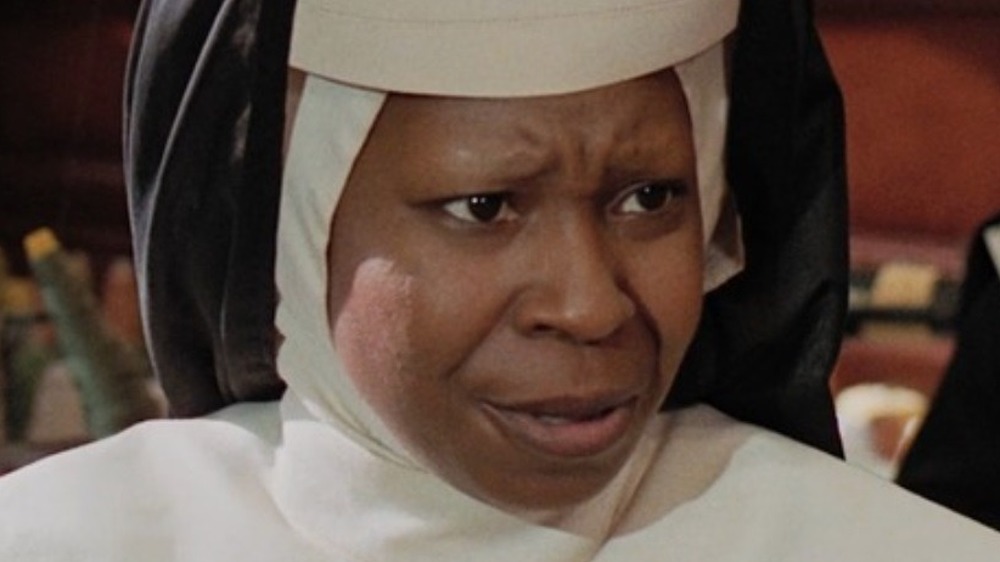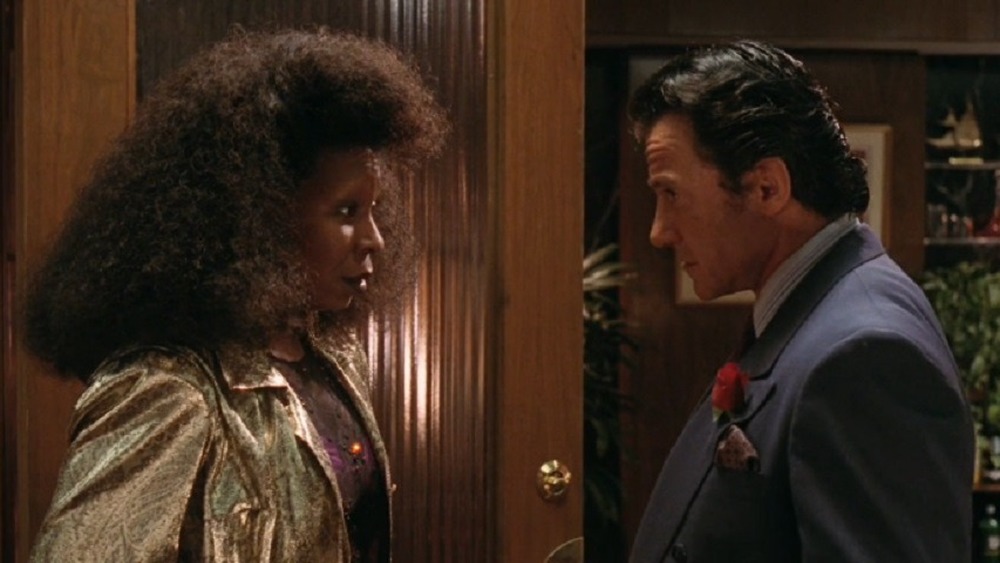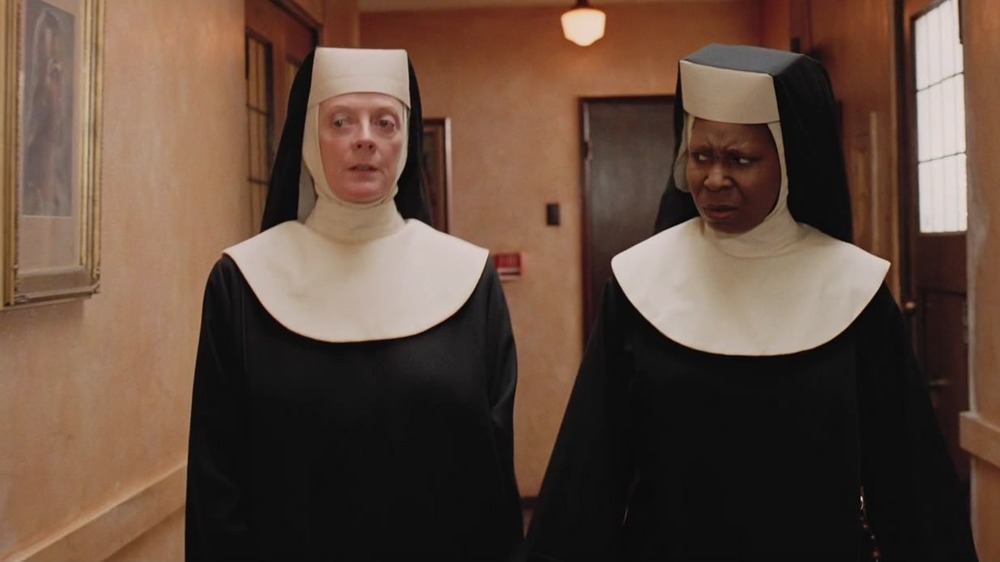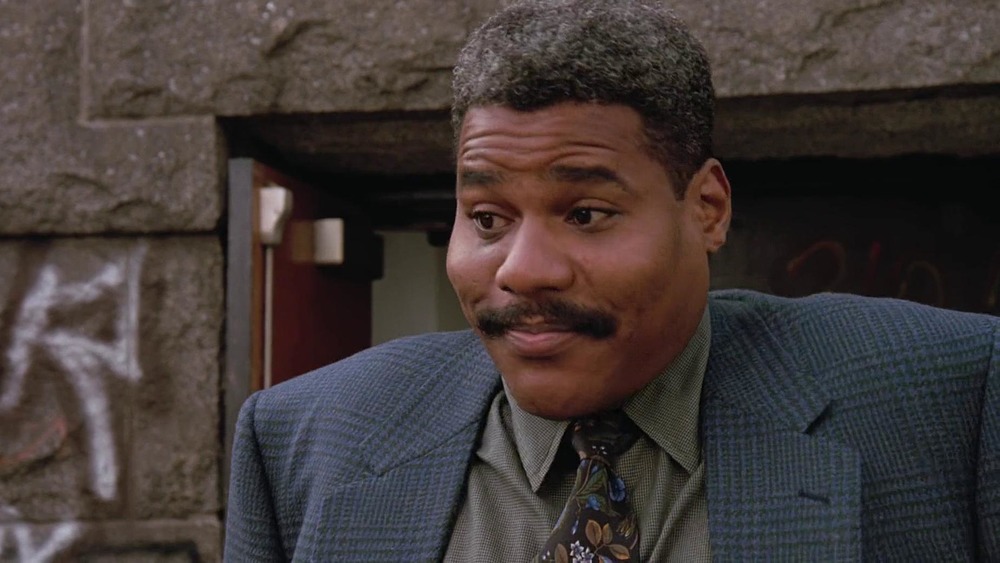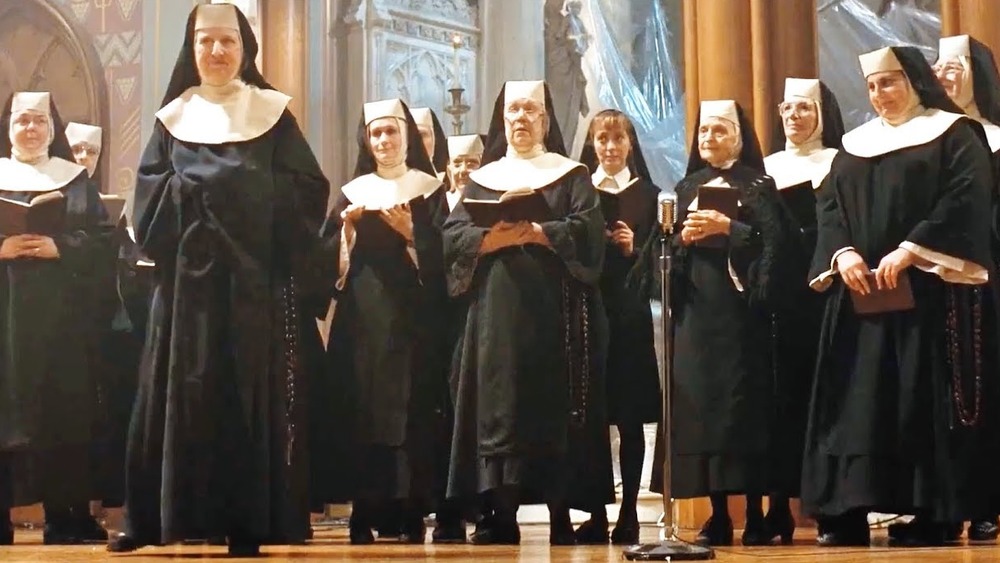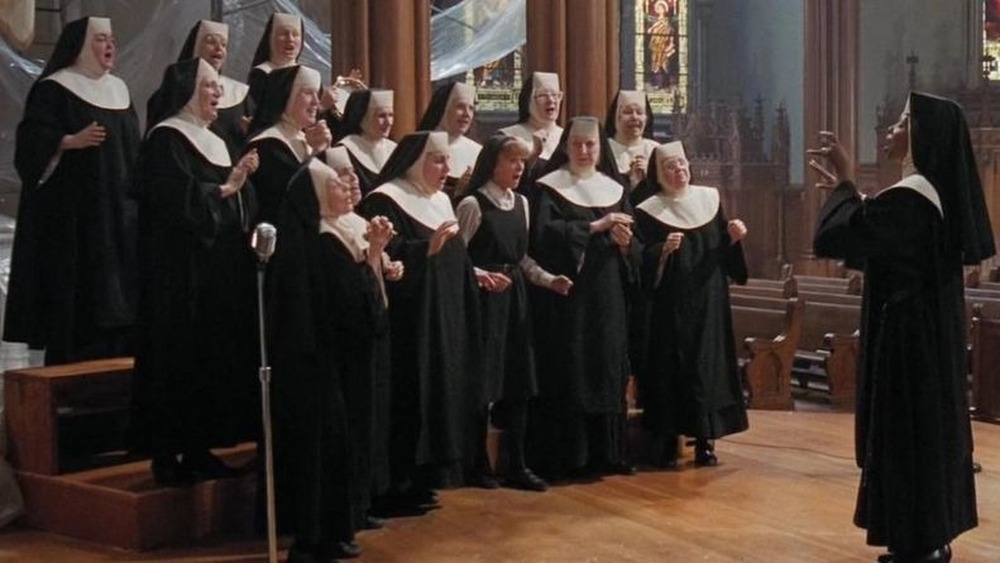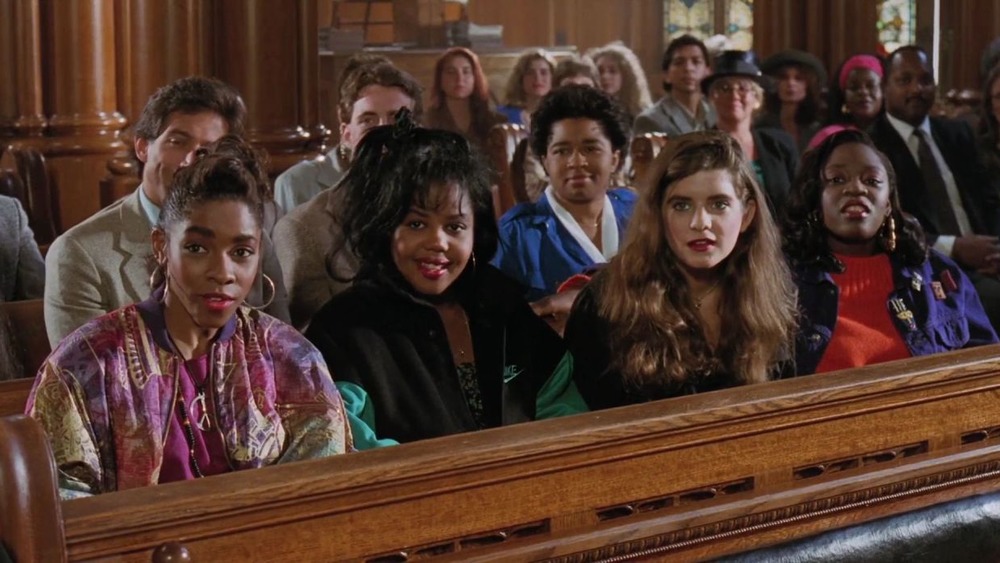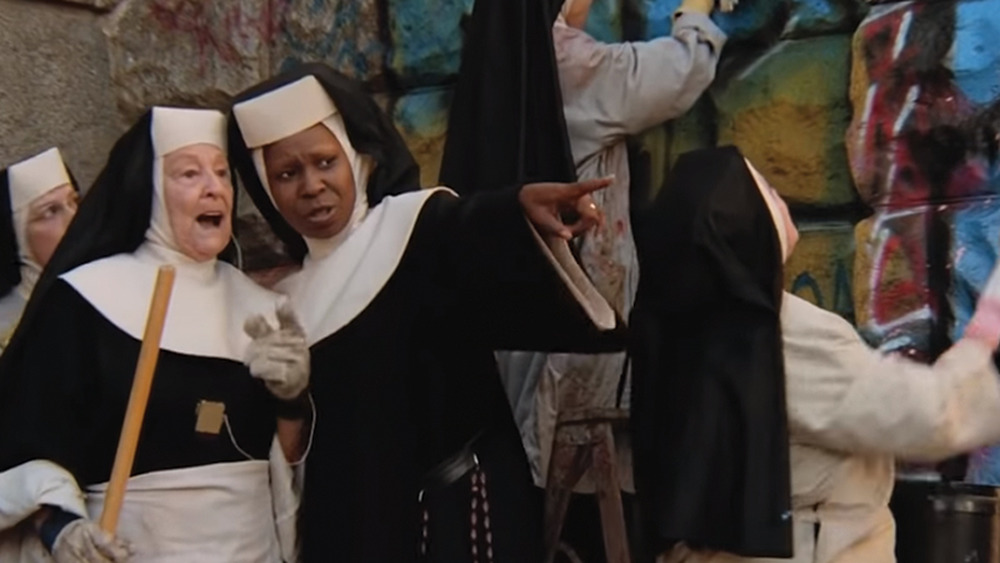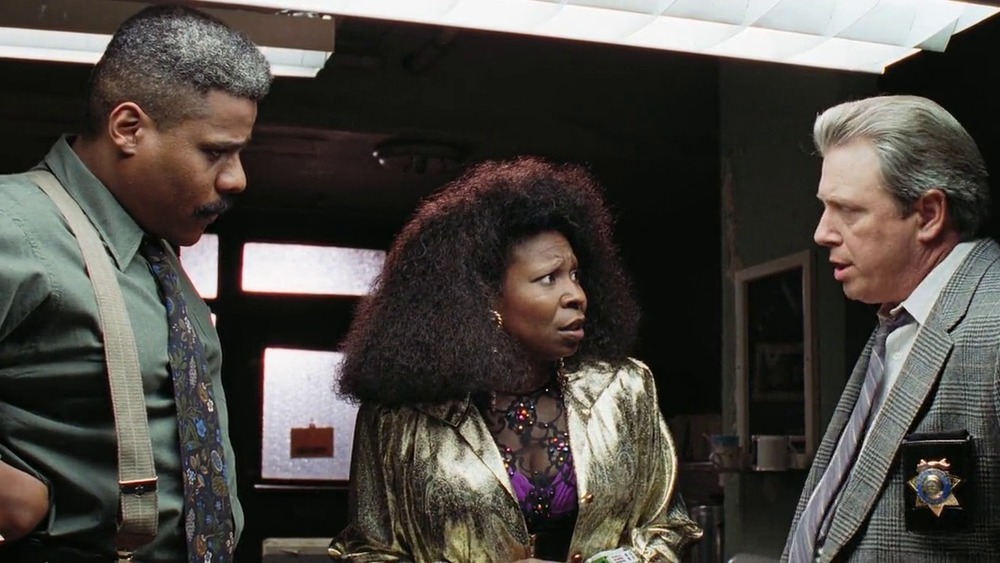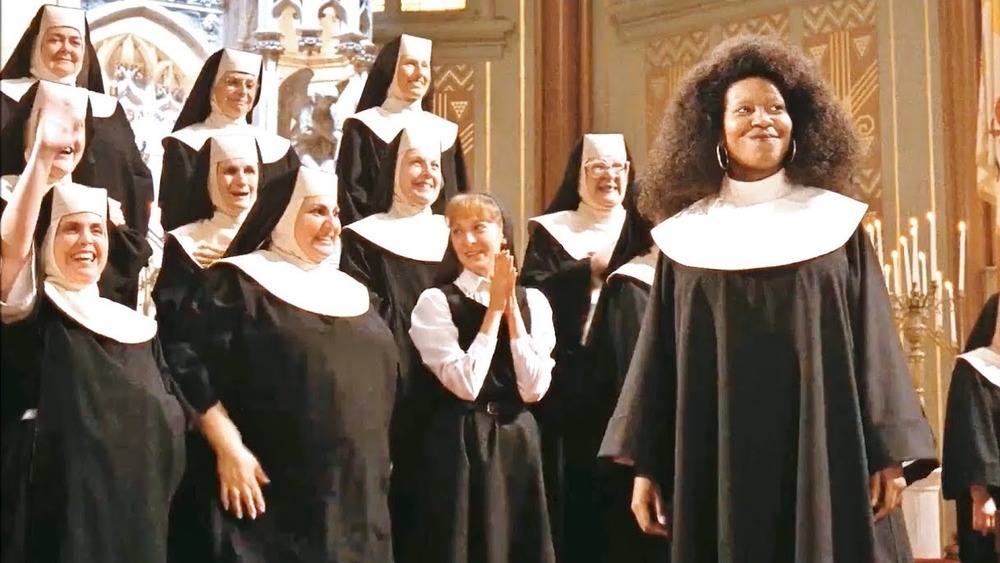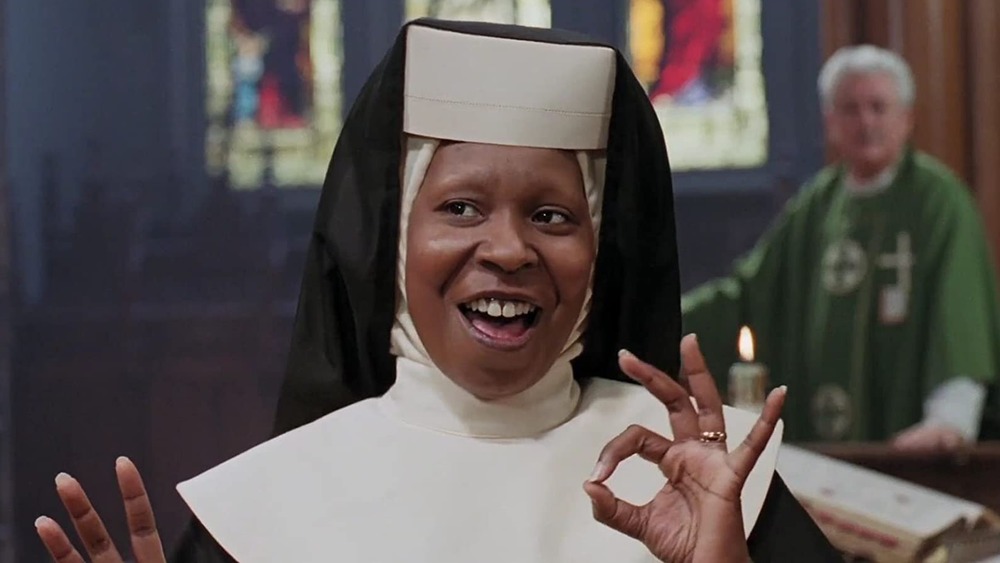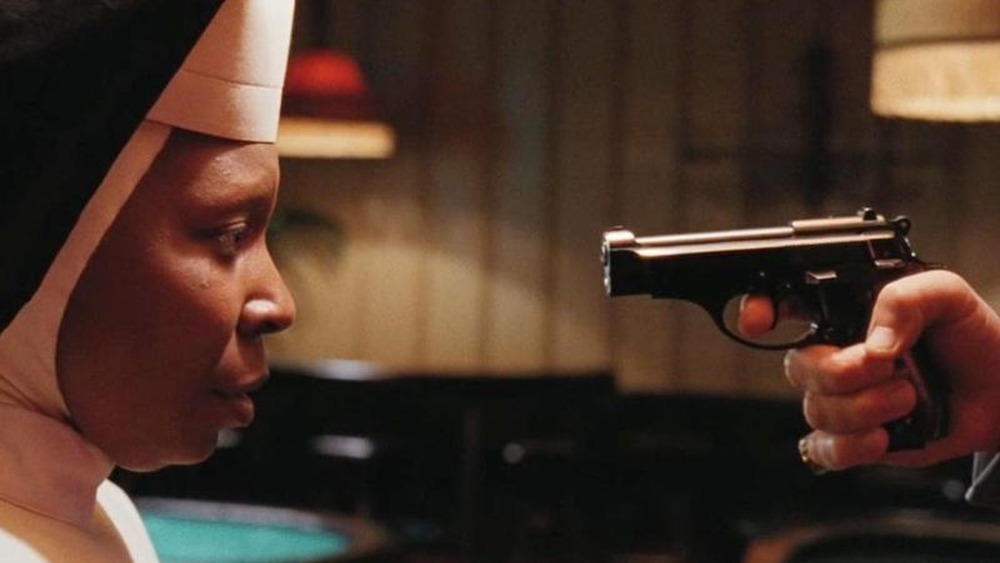Things Only Adults Notice In Sister Act
It's been nearly 30 years since Sister Act first hit screens, starring Whoopi Goldberg as a lounge singer forced to go into the witness protection program as a nun after witnessing a murder. For the most part, the family-friendly film still holds up today, although viewers who first saw the adventures of Deloris Van Cartier (Goldberg) and her heavenly brigade of friends as children in the '90s will likely have a very different experience watching the movie today.
While kids will be mostly inclined to engage with the somewhat bizarre film on its own terms, adults are more likely to wonder about some of the stranger choices the film makes. And we're not just talking about the decision to base a children's film around a nightclub singer struggling to get out of an abusive relationship with a married man — not exactly the most relatable scenario for most kids. Some of the actions and plot lines don't really make a lot of sense when you poke at them, while others feel like they could have darker implications when examined closely. Here are just a few of the things only adults will notice in Sister Act.
Adults realize that Vince's Catholicism doesn't make a lot of sense
Religion, specifically Catholicism, plays a central role in Sister Act. Not only does Deloris get stashed away in a convent, but her whole conflict with her married boyfriend, Vince (Harvey Keitel), is kicked off by an ostensibly religious dispute. Vince tells Deloris he can't get divorced from his wife because when he went to confession, the priest told him that divorce would be a sin. Vince's argument is that to go ahead with the divorce would be going against the priest and would therefore get him excommunicated. So he proposes that they just continue on with their arrangement as is.
However, while the official stance of the Catholic Church is indeed that divorce is wrong, it also holds the same view toward adultery, which Vince seems just fine with. Further, we later learn that Vince has a nasty habit of killing people who stand in his way, another thing the Catholic Church would definitely be opposed to. Kids may buy Vince's explanation that he doesn't want to violate his religious beliefs, but adults will see right through his tactics and recognize them for what they are — abusive manipulation and gaslighting, designed to make Deloris feel bad and absolve him of any guilt while simultaneously making her feel morally obligated to remain in the relationship, despite her discomfort.
Victim-blaming is rampant in Sister Act
Although Sister Act plays it for comedy, the circumstances that land Deloris at Saint Katherine's Convent are probably the most traumatic in her life. After all, while she knew her boyfriend was married, she had no idea he was a murderous crime lord. She'd prepared herself for a simple break-up conversation and ended up running for her life. Her agreement to testify against Vince in exchange for police protection is actually one of incredible bravery, putting herself in Vince's crosshairs instead of quietly disappearing.
Yet when she shows up at Saint Katherine's, Mother Superior (Maggie Smith) seems determined to blame Deloris for her unfortunate circumstances. Upon first meeting her, she disdainfully runs down a list of rules for the convent, as if daring Deloris to break them. "Do you understand I'm the victim here?" Deloris asks, to which Mother Superior responds, "People wish to kill you. Anyone who's met you, I can imagine."
Imagine, having to hide from someone you trusted because you thought they were going to kill you and then having a nun insinuate that you probably deserved it, just by existing. As if that isn't enough. Mother Superior then takes Deloris' food away as punishment for not fitting in right away. It seems like she's punishing Deloris for getting herself into this situation and hiding in the convent, even though Deloris is the victim and didn't have a choice in the matter.
Eddie Souther undermines the Reno PD's entire strategy
After Deloris witnesses a murder and makes her great escape, Vince seems to write her off. He doesn't send anyone looking for her, and he doesn't act particularly concerned that she might talk ... until Detective Eddie Souther (Bill Nunn) gives him reason to worry. After Vince is interrogated by the police for several hours, Souther pulls up in his car outside the police station and taunts Vince, telling him with a big smile that he "should be real scared."
Until this moment, Vince never even seems to consider that Deloris might be in witness protection. However, Eddie's taunts, along with his smug attitude, tip Vince off that the police must have a not-so-secret weapon that's granting Eddie his confidence, and it's not much of a logical leap for him to connect the dots to Deloris. Later, Eddie even drops a hint about Deloris' location to a colleague — even though he knows there's a mole in the department — when he says, "I wouldn't even tell the Pope [Deloris' location]." If Eddie had only resisted the urge to wave his advantage right in front of Vince's face, the gangster may have never realized that the Reno Police Department had a crucial witness to his crimes tucked away, and he may never have made it his mission to suss out her location in the first place.
Why is the choir a cappella?
The first time Deloris hears the choir of Saint Katherine's perform during mass, they don't use any instrumental accompaniment, even though they have an accompanist sitting right there. Rather than play along with the choir while they sing, the musician merely plays an opening chord to give them their pitch — one they only loosely seem to grasp — and then an ending chord once they finish singing. Later on, once the choir has significantly improved under Deloris' direction, the accompanist plays the entire time.
This is a group that readily admits that they're terrible. None of the members are under any delusions that they sound anywhere close to good, including their previous director, Mary Lazarus (Mary Wickes). Why not use the piano to make them a little less awful or at least keep them relatively on pitch? A cappella singing can be challenging even for much more established and advanced groups. For a group like Saint Katherine's choir, it almost feels like they're bad on purpose.
Sister Act's choir has quite a transformation
The first time we hear the Saint Katherine's choir perform, their introduction seems to imply that the group performs a selection every week during mass. Deloris steps into her leadership position in the choir the following week, and the next time we see them is during her public debut as director, which implies that it's been a mere seven days after the previous performance and even less time since Deloris has taken over for Mary Lazarus.
Yet when they perform, the transformation is remarkable. Not only does Deloris manage to take the choir from sounding like squalling cats to being able to perform a traditional hymn with mostly pleasing harmonies, but she also adds in a big musical twist ending in the matter of just a few rehearsals. For viewers who've spent time in a choir, it feels improbable that any group would improve so drastically in just a matter of days, even without adding in the solos and the upbeat, reimagined ending. It's a pretty impressive pivot, even if the choir wasn't awful to begin with.
Packing the pews seems unlikely
One of the most enjoyable scenes in Sister Act has to be the choir's first performance under the direction of Deloris (going by the name of Mary Clarence), when they perform their rendition of "Hail Holy Queen." After wrapping up a straightforward traditional version of the hymn, they then transition into an upbeat, gospel-infused rendition of the song, which is so unusual and interesting that several people wander in off the street to check out what all the musical hubbub is about, including a group of teenage girls who happened to be walking by.
Kids will probably accept this development without question. Of course people would want to see the choir and experience their new sound! But adults may wonder ... has anyone ever actually walked in from the street out of curiosity to check out the music during a church service? Especially teenagers who seemed to have no prior interest in checking out that church? It's not even as though the music had universal appeal to a youthful audience. Any way you spin the choir's new style, it's still singing nuns. Even when Deloris contemporizes the group further by having them sing Christianized covers of pop hits, those tunes are from the '60s and, therefore, unlikely to draw in the '90s grunge crowd. The church's sudden boom in popularity is a lot of fun to watch, but adults will realize it makes very little sense.
Adults know that's a dangerous PR move
After the Saint Katherine's choir explodes in popularity under Deloris' leadership, the sudden jump in attendance understandably draws the attention of local news crews, especially since the reason for all the interest is something as TV-ready as a sassy choir of nuns. However, while it makes sense that the media would be interested in Saint Katherine's surge in popularity, you'd think that the convent and church itself would be at least a little more cautious in how they engaged with the story, considering that they know that Deloris is in the witness protection program.
Sure, according to Deloris, the news crew who catches her on film "just showed up," but whose bright idea was it to have her outside after they started filming? Wouldn't it have been prudent to get her inside right away, where she could lay low until they were gone? What's more, clearly someone gave an interview to the news station giving Deloris credit for the revitalization prior to their film coverage. Even allowing for the possibility that it was one of the other nuns who didn't realize Deloris' precarious position, shouldn't it have occurred to Mother Superior or Bishop O'Hara (Joseph Maher) to quietly spread word that they didn't want to credit any one person for the transformation, perhaps out of humility or some other plausible reason? You know what they say, no publicity is bad publicity ... unless you're in the witness protection program.
Anyone looking for Deloris would just need to follow the detective
Let's recap what we know of Detective Eddie Souther's police work. First, he hides his key witness in a secret location only he knows about, where no one would ever think to look for her. So far, so good. Then, he taunts the subject of his investigation, hinting that he's got a secret weapon that should make him very nervous. Meanwhile, he acknowledges there's a mole somewhere in the police department, but he doesn't let that stop him from dropping hints about where his witness is hidden to his colleagues. Suddenly, Eddie's strategy seems like it could use some work.
But as if that wasn't questionable enough, he then goes to the convent where Deloris is hidden to warn her about her conspicuous actions in person ... then stays for the church service. A service at a congregation that he just saw is the subject of media scrutiny. Seriously, why is Eddie showing his face at a church he doesn't regularly attend, which was made suddenly famous due to its new Black nun choir director, during a murder investigation where the star witness is a Black female singer? Shouldn't he consider that he might be followed? Kids may not question Eddie's actions, but adults will definitely wonder how Eddie thinks he can possibly keep Deloris hidden if he's going to be so sloppy about it.
In Sister Act, is the Pope's visit really a good idea?
Let's get this out of the way first. Obviously, no struggling convent is going to turn down a visit from the Pope. So when His Holiness himself announces that he'll be spending a Sunday morning at Saint Katherine's, there's really no universe in which Mother Superior and Bishop O'Hara say no. However, you'd think that with their knowing the choir director is in the witness protection program for witnessing a murder, it may occur to either of them to make at least a couple modifications to their plan in order to keep Deloris safe.
While the Pope's schedule is probably pretty tight — so it likely wouldn't have been an option to bump his visit to a month in the future once Deloris was on the opposite side of the trial — there were other accommodations they could've made for the sake of her safety during an event that was sure to draw a lot of media coverage. The most obvious is that they could've transferred the choir director role to someone else, so Deloris wouldn't have had to be front and center. Yes, this would've raised some eyebrows internally, but surely they could've come up with some sort of plausible excuse for the change.
Failing that, they could have made plans for Deloris to be conveniently "sick" on the date of his visit, but we never see those plans taking shape either. All signs seem to point to Deloris planning to conduct a concert for the Pope on national TV while in witness protection. If that's the case, one has to wonder why she ever bothered giving up her nightclub act in the first place.
Deloris picked the wrong career
Throughout Sister Act, Deloris makes it clear that she has big dreams for herself. Not content to sing in Reno lounges forever, she has plans to head to L.A., Chicago, or wherever the wind takes her to make it big. After she's forced into witness protection, she views the convent as a mere bump in the road on her path to becoming a famous singer — which, in a way, she does once her work with the Saint Katherine's choir becomes national news.
However, perhaps Deloris picked the wrong artistic field. After all, while she definitely can sing, she actually proves to be an exceptional actor. Once she gets kidnapped by Vince's goons, Deloris quickly deduces that her best shot at buying herself some time is to really lean into the nun persona, in the hopes that her abductors will be too morally conflicted about shooting a nun to kill her. Her gambit pays off ... for a while anyway. But even when it looks as though Deloris' time is up, with two guns pointed at her chest and her captors counting down to what she presumes will be her death, she still sticks to the bit. Ultimately, it's her ability to not break character, even in the face of certain death, that winds up saving her life. Kids may not understand what "method acting" is, but adults will realize that's some serious commitment to a role.
Why would Deloris turning herself in keep the others safe?
After Deloris gets captured, her sisters at Saint Katherine's take it upon themselves to come to the rescue rather than count on the police to get there in time. And it's a good thing they do. Their intervention buys Deloris the precious few extra minutes she needs until Eddie and the rest of the police show up. However, before Eddie arrives to save the day, Deloris decides to give herself up to Vince, as long as he agrees to spare her friends.
Except ... why does Deloris seem to think that Vince wouldn't hurt the nuns after he shoots her? After all, the whole reason Deloris is in trouble in the first place is because she saw him kill someone. It goes to figure that if they all witness him shoot her, they'd all be liabilities, too. And while Vince's henchmen seem to have a moral hang-up about shooting nuns, Vince himself has no such qualms. Practically speaking, it seems like Vince would make things a whole lot harder on himself, legally speaking, to shoot a convent full of nuns, but considering he already doesn't seem to see a problem with murdering Deloris in front of a bunch of nuns, he's probably not too concerned about that.
Fortunately, the police arrive before the bloodbath can start, but if not for Eddie's well-timed shot, the end of Sister Act could've wound up looking less like a family-friendly Disney film and more like the ending of The Departed.
